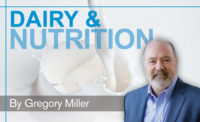US dairy shares environmental sustainability strides
National Dairy Council and other industry organizations are participating in global dialogues about reducing dairy’s footprint.

The United Nations Food Systems Summit (UNFSS) takes place in September with a goal to “launch bold new actions to transform the way the world produces and consumes food, as part of the Decade of Action to achieve the Sustainable Development Goals by 2030.”
Fortunately, this event and the U.N. Sustainable Development Goals (SDGs) didn’t sneak up on the dairy community. In fact, we saw the signals of change coming from thought leaders and consumers 14 years ago. How milk and other foods are produced matters as much — or maybe more, to some people — as their nutrition and wellness benefits. This reality led to the U.S. dairy industry conducting its first lifecycle assessment.
I had the opportunity to help lead this work and am proud that U.S. dairy took a proactive step to identify and understand its environmental footprint. Our research gave us a valuable baseline: that U.S. dairy contributes about 2% of U.S. greenhouse gases. This work was done voluntarily and with the backing of our nation’s dairy farm families, who have always operated in a forward-thinking, science-based fashion.
A sustainability dialogue
National Dairy Council (NDC) has been busy sharing how U.S. dairy is committed to being part of a nutrition and sustainability solution as it works to do its part to help achieve the SDGs. NDC staff participated in many activities leading up to the summit, including UNFSS forums, science days and a recent pre-summit event held in Rome and virtually. The pre-summit event brought together diverse sectors of people from across the globe to examine the latest evidence-based and scientific approaches to food systems transformation.
Earlier this year, NDC and the U.S. Dairy Export Council partnered with The Nature Conservancy and the Global Child Nutrition Foundation to host a U.N.-sanctioned dialogue that included dairy’s essential role in sustainable food systems. More than 100 thought leaders — including school nutrition experts, scientists, dietitians and employees of nongovernmental organizations and brands — participated.
They heard from health, sustainability and industry experts, including some of our farmers, and hopefully walked away with more insights into how dairy functions within a sustainable food system through its social, economic and environmental pillars. Among the strongest proof points we shared, beyond dairy’s nutrition and health benefits, were the 2050 Environmental Stewardship Goals, Net Zero Initiative and the Farmers Assuring Responsible Management program.
There is no doubt that many eyes from across the globe will be focused on the events this fall, where we can expect to see game-changing solutions and recommendations. The U.S. dairy industry will be part of the discussion to reinforce the dedication to progress and solutions it can bring to the table as a valuable contributor to a sustainable food system.
Gregory D. Miller, Ph.D., is global chief science officer for National Dairy Council.
Looking for a reprint of this article?
From high-res PDFs to custom plaques, order your copy today!





